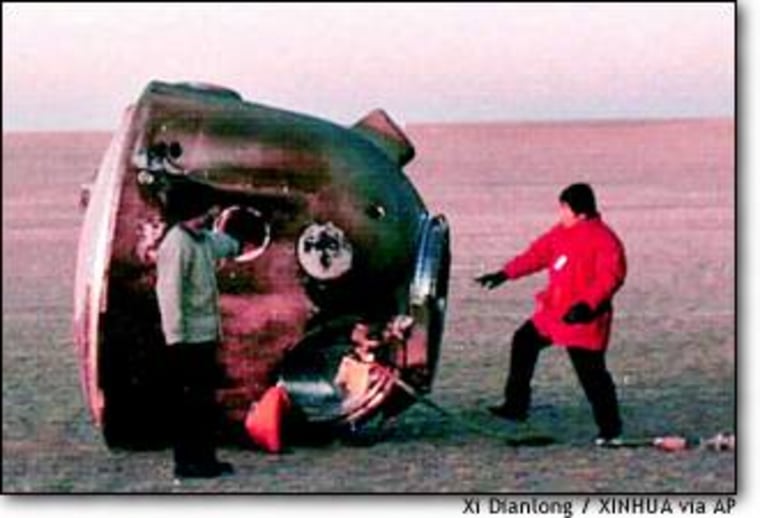A new test flight of China’s manned spacecraft, the Shenzhou, is expected soon, Western experts say — and the ultimate destination for future manned flights of that vehicle may be the international space station.
BEFORE THE REALIGNMENT of world diplomacy that followed the Sept. 11 terrorist attacks, China’s participation in the $60 billion-plus international space station was generally considered a preposterous idea. The space alliance of the United States, Russia, Canada, Japan, Brazil and 11 European nations seemed to have no room for a country whose internal human rights record didn’t meet their standards.
But as with so many other assumptions about international politics, this one too is now being questioned. Both through face-to-face negotiations, and through the space testing of impressive new hardware, China seems to be knocking on the door of the orbital outpost.
On Oct. 20, Chinese space experts announced that a new “CZ-2F” rocket had passed flight qualification at the factory in Beijing. It will shortly be sent by rail to a secret spaceport in Inner Mongolia, where Chinese engineers are preparing a third test flight of their Shenzhou space vehicle. The unmanned mission will mark one more advance towards China’s near-term goal of putting its own astronauts into space.
Early this month, Chinese space experts attending a world space conference in Toulouse, France, discussed the impending flight openly while handing out lapel pins in the form of the spacecraft. The Shenzhou 3 launch is expected before the end of the year, say Western experts.
“I am assuming a flight like Shenzhou 2,” British space flight expert Phillip S. Clark told MSNBC.com. “Maybe with the orbital lifetime pushed a little further, and maybe a little more maneuvering.”
Last January’s Shenzhou 2 test lasted six days, during which the craft raised its orbit several times. That mission, explained Clark, was a “quantum leap” over the first test of a stripped-down Shenzhou capsule in November 1999, which lasted less than a day.
Chinese space engineers took advantage of existing Russian designs to hold down the development cost of the Shenzhou vehicle. Laid out roughly on the tried-and-true Russian Soyuz spaceship configuration, the Shenzhou sports an emergency escape system. China has designed spacesuits practically identical to those used by the Russians. Shenzhou reportedly also will be equipped with docking mechanisms modeled after the Soyuz, which makes it completely compatible with the international space station.
China has already taken on a small but substantial role in the space station’s scientific program. The Chinese Academy of Sciences is building an antimatter detector to be installed aboard the space station in 2003. An earlier version of the device, called the Alpha Magnetic Spectrometer, flew on the space shuttle Discovery’s mission to the Mir space station in June 1998.
FINANCIAL HELP WANTED
Financially speaking, the space station effort could use all the help it can get. NASA is struggling with billions of dollars in cost overruns, and Russia’s space program is dealing with its own financial problems. Even before Sept. 11, there were some pieces of future hardware that the current partners could no longer afford to build — raising serious questions about the project’s scientific future.
Rep. Dana Rohrabacher, a California Republican who chairs the House space and aeronautics subcommittee, recently toured Europe seeking new partners to help pay for future hardware. He reported encouraging responses from Ireland and from the United Arab Emirates in the Persian Gulf region.
But Rohrabacher told journalists that China would not be allowed into the club — even though Chinese hardware might be able to supplement or even replace Russian contributions within two years. “The space station’s supposed to stand for something better,” he said, referring to China’s poor human rights record.
Russian space officials do not seem to share Rohrabacher’s scruples. Last month, an official with the Russian Aviation and Space Agency praised the “definite progress” in expansion of Russian-Chinese cooperation for human space flight. “Cooperation is proceeding at three levels — governments, national agencies and enterprises,” noted Georgy Polishchuk, the space agency’s assistant director general.
In an internal NASA memo, space official Jesco von Puttkamer noted that Energia, the corporation that builds and operates human space vehicles for Russia, “expects to play ‘the leading role’ in Russia’s effort to help the Chinese manned space program.”
Even the European Space Agency, NASA’s longtime partner, reportedly is in favor of Chinese participation in the space station. According to Chinese press reports, ESA is to discuss the time line for Chinese admission to the project at its ministerial-level meeting in Edinburgh in November.
“I certainly think that the Chinese are preparing for the possibility of joining the ISS partnership in the not-too-distant future,” said Charles Vick, a space policy expert at the Washington-based Federation of American Scientists. “The European joint work with Chinese experiments on ISS is laying the groundwork for this potentiality.”
WHAT’S IN IT FOR CHINA?
China’s own motivations are based on the international prestige such a participation would bring them. Chinese National Space Administration chief Luan Enjie recently claimed that such advanced projects have an “immeasurable usefulness to raising national prestige and inspiring the nationalistic spirit.”
Luan also described plans for the step-by-step exploration of the moon. This would allow China to “struggle for a more important place in the world space science field and raise our deep-space exploration technology to a higher standard,” he said.
The transfer of space technology to the Chinese would certainly be of concern to the U.S. Congress, Vick told MSNBC.com. He said China’s formal compliance with nonproliferation agreements such as the Missile Technology Control Regime, or MTCR for short, would be key.
“I personally would rather have them with us than competing against us, as long as the MTCR and other technology issues can be effectively dealt with to prevent any of the suggested problems previously experienced in our relations with China,” he said in an e-mail exchange. “Chinese spies on ISS are simply unacceptable. This is a very political issue for the U.S. Congress.”
Whatever the practical value of the growing Chinese association with advanced space projects, some American experts say the political and psychological angles are paramount as well.

“The trend today is toward international cooperation,” Dwayne Day, an expert in international space policy and a visiting fellow at the National Air and Space Museum in Washington, told MSNBC.com via e-mail. If China chooses to remain independent of the international space station, continued Day, they “run the risk of being the kid bouncing the basketball on the edge of the playground while everyone else is in the game.”

But Day feels that political objections to Chinese internal repression may be a barrier to being invited into the project.
“China will not become part of the international space station program until they stop acting like China,” he explained. “They have to stop behaving like bullies before they will make any friends.
“Normally, I’d suggest that China has as much chance of becoming a partner in ISS as a pig has of winning a bathing-suit contest,” Day said.
Referring to the scrap between NASA and Russia over the space tourist mission last April, Day suggested the Russians might choose to send a Chinese astronaut to the space station aboard a Soyuz rocket, just to spite NASA.
“We have seen that the Russians may have an interest in occasionally poking the Americans in the eye” on high-profile space projects, he said.